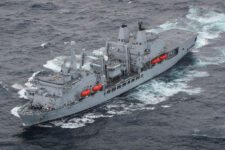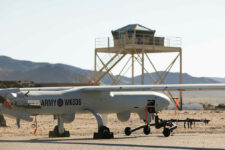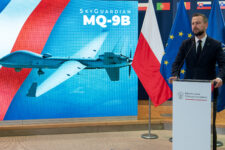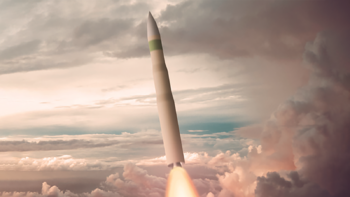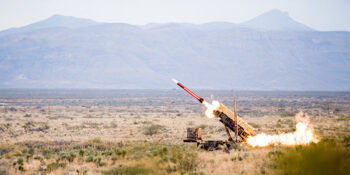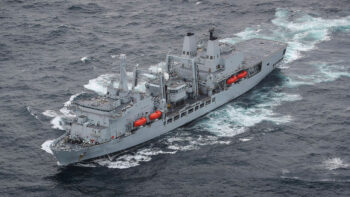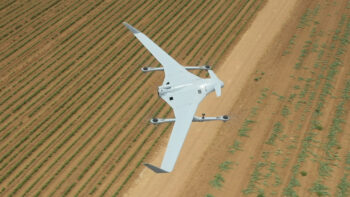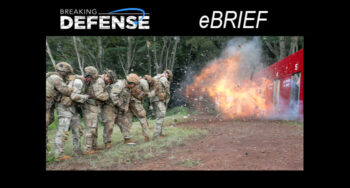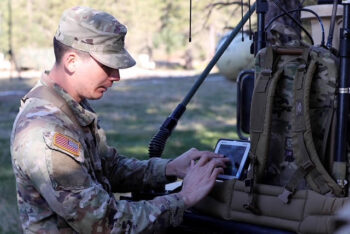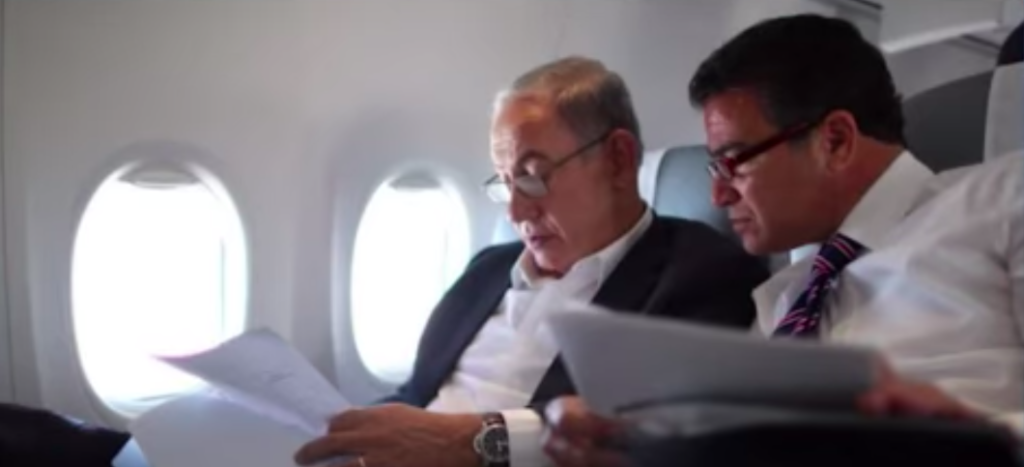
Israeli Prime Minister Benjamin Netanyahu with then-national security advisor Yosef “Yossi” Cohen, now director of the foreign intelligence agency Mossad.
TEL AVIV: Even as Mideast tensions escalate, with new Israeli strikes on Syria over the weekend and Iran exceeding international limits on enriched uranium, no less a figure than the director of Mossad sees a historic opportunity for peace. Why? Because Iran’s escalating aggression — especially attacks on its neighbors’ economic lifeline, oil exports — have pushed Sunni Arab monarchists, long hostile to Shiite Persian revolutionaries, towards a de facto alliance with Israel.
“The Mossad has identified at this time a rare opportunity — perhaps the first in the history of the Middle East — to reach a regional understanding that would lead to an inclusive regional peace agreement,” spy chief Yosef “Yossi” Cohen said in a rare public appearance. “Common interests, the fight against rivals such as Iran and Jihadist terrorism, close relations with the White House, and channels of communication with the Kremlin all combine to create what might be a one-time window of opportunity.”

An Imagesat International photo of a suspected S-300 anti-aircraft site in Syria, noting four missile launchers and recent work to level the road for easier access by the truck-mounted, Russian-made system.
Rising Violence
At the same time, Cohen warned Iran that Israel would not tolerate it developing a nuclear weapon or building up bases in Syria, where Israeli airstrikes reportedly killed 10 Sunday. In his remarks at the annual IDC Herzliya conference, he was also the first Mossad official to publicly declare that the Iranian Revolutionary Guard Corps carried out the recent attacks on oil tankers and infrastructure in the Gulf, with approval from the highest levels in Tehran.
“I say with certainty that Iran is behind these attacks: They were approved by the Iranian leadership and carried out by the Revolutionary Guards,” Cohen said. The Revolutionary Guard and Iranian intelligence have also conducted lethal attacks in Europe and built up a network of 300 agents in Africa, he said, as well as building up logistical and operational bases in Syria for itself and its Lebanese proxy Hezbollah.
The Israeli strikes this weekend hit Iranian-linked targets in an area that has been hit several times before, despite the recent deployment of a Russian-made S-300 surface-to-air missile battery there. Israeli sources said these advanced anti-aircraft weapons remain under close Russian control and the success of Sunday’s attack showed Moscow and Jerusalem are coordinated closely to avoid any clash in Syria.
“We can’t agree to Syria becoming a staging ground for Iranian forces or forces operated by it against us,” he said. “We can’t agree to Syria becoming a logistics base for transferring weapons to Hezbollah and Lebanon. Israel has taken action in the past four years, overtly and covertly, about which only a small amount has been published, in order to block the entrenchment and the production lines of precision-guided munitions,” he said. “Thanks to that resolute action, I believe the Iranians will ultimately reach the conclusion that it’s not worth their while.”
“Iran and Hezbollah are asking to move their bases to northern Syria,” he added, “an area that they mistakenly believe will be difficult for us to reach.”
The biggest danger, however, would be Iranian development of a nuclear weapon, which came one step closer that Iran has enriched more uranium than permitted under the 2015 nuclear deal, now largely moribund after President Trump’s withdrawal.
“Imagine if Iran gets military-grade uranium and then an actual bomb,” Cohen said. “The Middle East and, I think, the world will look different if this happens, so the world can’t allow this to happen.”
“Mossad (and) the State of Israel did not sign the nuclear deal,” Cohen said, “[and] will do everything to ensure that Iran will never have nuclear weaponry.”
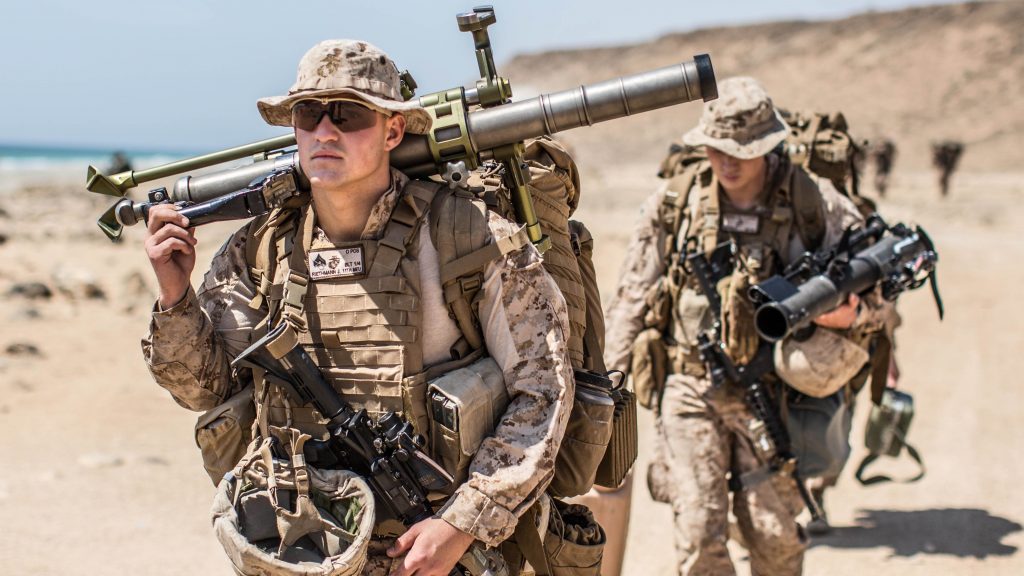
A Marine carries a mortar during an exercise in Oman.
Progress Amidst Chaos
Yet Israel is meanwhile making progress with its Arab neighbors, not in spite of rising tensions with Iran but because of them. Just yesterday, Israeli foreign minister Israel Katz visited Abu Dhabi, capital of the United Arab Emirates. Before that, Prime Minister Benjamin Netanyahu had high-level meetings with the sultan and foreign minister of Oman, although the south Arabia nation still says formal relations with Israel can only follow creation of a sovereign Palestine.
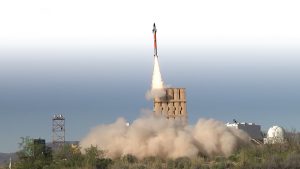
Iron Dome missile defense system.
And last year, according to UAE website Al-Khaleej Online, Saudi Arabia purchased Israel’s Iron Dome missile defense system to protect its territory from rockets fired by Iranian-backed Houthi rebels in Yemen. (The Israeli government denied the sale). The arms deal, part of a much larger rapprochement between Israel and the Saudis, was reportedly brokered by the United States, which got Israel to overcome its initial unwillingness to sell the advanced weapon system.
Such public diplomacy, however, is the fruit of years of clandestine effort to improve relations between Israel and its Arab neighbors, of which only Egypt and Jordan have formal relations with the Jewish state. That effort has been led by Mossad and backed by the US.
“We created a task force that is focused on the field of foreign policy and strategy that is meant to advance [good relations] with the various tools at the disposal of the Mossad and outside it,” Cohen said. The recent opening with Oman in particular, he said, followed “a lengthy covert effort by Mossad.”
While only Jordan and Egypt have full relations with Israel, he said, there is “an expanding group of responsible, serious countries” which have unofficial but effective “open channels of communication with Israel” and cooperate with it against Iran.
Italy inks deal to buy up to 24 more Typhoons, Leonardo says
The contract with Rome follows hard on the heels of a deal with Spain for 25 Eurofighter Typhoon fourth-generation fighter jets under the country’s Halcon II program.




